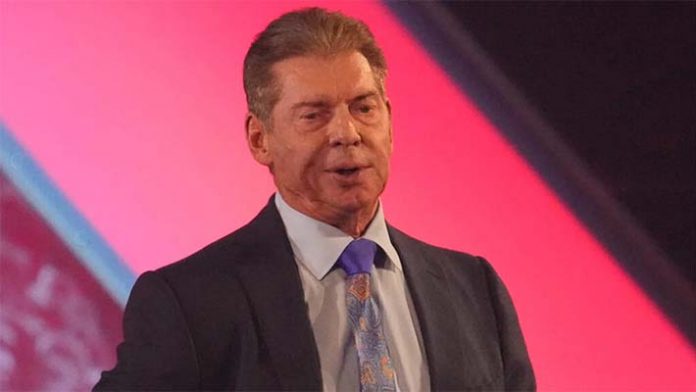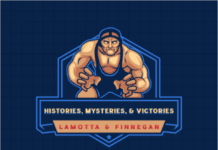
Earlier this week, the “Nine Lives of Vince McMahon,” a two-hour exposé on the downfall of the kingpin of sports entertainment, aired on Vice TV. This was a highly-anticipated program, particularly for its association with the Dark Side of The Ring series, which garnered rave reviews.
All things considered, I have to say, the “Nine Lives” feature falls well short of the standard of both the original Dark Side episodes, as well as the editions of Tales from The Territories.
Both Dark Side and The Territories have done very well for Vice TV so it was no surprise that the network would examine Vince McMahon’s swift fall from public billionaire to being ousted from the organization he took to a global level. Dark Side of the Ring was praised for its unsanitized and report-style look at pro wrestling controversies that either weren’t discussed on a national level before or stories that were only presented with the WWE spin of the narrative. That said, I found McMahon episode to be too much like a tabloid show, with the sole intention to try to paint Vince as a failure that somehow succeeded in spite of that, which just isn’t accurate. You don’t have to like Vince McMahon, and the way he conducted himself was definitely sleazy, if it wasn’t criminal, but the entire show seemed like it was a cut and paste job to get something on television while his exit was still a current topic.
Has Vince tried and failed at other ventures? Sure, but other than to attempt to take a jab at him, what does a failed Evel Knievel pay-per-view have to do with the misconduct scandal or even the premise of “nine lives” on this episode? In my view, McMahon had nine lives because he didn’t go bankrupt when the WWF was on the ropes in 1997, he refused to do the job for Uncle Sam in 1994, the WWF maintained its hot streak despite the negative publicity after the tragic accident that took Owen Hart’s life in 1999, or that the Benoit tragedy didn’t destroy the business in 2007. The steroid scandal of the early-90s was probably the biggest threat to McMahon’s empire and the time spent on that in this presentation was minimal. Keep in mind, the steroid scandal of that time period was already the subject of an episode of Dark Side of the ring so there was a huge portion of the footage used that was recycled from that series.
It appeared, at least from my view point, that the first hour was to tell the audience how terrible of a person Vince is supposed to be and then the second hour was designed to focus on the affairs that would then “prove” that he is an awful person. Don’t get me wrong, Vince might be a creep or sleazy for paying to keep his affairs quiet, but that doesn’t change the fact that what could’ve been a riveting documentary on one of the biggest stories in the history of the industry was reduced to clips slapped together without much detail on the actual story of the episode.
This had the potential to be this generation’s “Wrestling with Shadows” as far as what it could’ve uncovered about the inner workings of the sports entertainment business, but it was forgettable.
The reasons why for this are numerous, but it boiled down to the fact that this was rushed to television so there wasn’t much done to provide actual context to the ripple effect the scandal had on the company. Vince Russo as a talking head was laughable, mostly because he hasn’t been around the WWE product for over 22 years, minus a two-week stint when it was determined that he was more or less unemployable in the WWE structure. Credit to Russo for somehow keeping a job in the wrestling business as long as he did, which translates to he was able to swerve Dixie Carter into paying him, but he’s so far removed from the WWE office that he provides zero insight into the current management of the organization. Dave Meltzer is one of the longest-tenured reporters of the industry and from a historical perspective is one of the best resources anywhere. However, Dave makes a living exposing the tricks of the trade so naturally, he’s not someone McMahon would view favorably. Furthermore, by the nature of his work, the negative publicity around the industry, including the steroid trial, provided Melzter with a hefty amount of “red meat” to write about to sell newsletter subscriptions. For many years, Meltzer was persona non-grata for the WWE. On the flip side, Tony Khan, the owner of the second biggest pro wrestling group in the United States is a reader of his newsletter and makes himself available for extended interviews. Taking all that into account, I’m not sure Dave is the most impartial person to interview for this episode. Bryan Alvarez was probably the most sensible talking head in this production and he’s someone that more often than not, takes a fair look at pro wrestling topics. His weekly podcast with underrated legend, Lance Storm is a hidden gem in the almost ludicrous amount of sports entertainment podcasts on the internet.
Aside from the talking heads that were hit or miss, because of the non-disclosure agreements that were signed, none of the females involved in the settlements from the initial Wall Street Journal reports appeared on this show. The misconduct, which might be skewed by legal jargon in the non-disclosure agreements, at least appeared to happen since a settlement was offered in the first place, but there’s not much context to it when very few names are public, and those talking in the episode are only providing the same information already publicized in the reports.
Don’t get me wrong, I’m not defending McMahon, when there’s this much smoke, there’s a fire somewhere and even if he did the least repulsive claims against him, he’s a total creep for how he treated women. The issue is how this production took the easy way to painted him in the worst light possible instead of what could’ve been a definitive chronicle of his exit from the company.
Vince Russo of all people calling McMahon “lazy” is insane. You can call McMahon a lot of things, but the bottom line is, he took pro wrestling from a regional business to a global industry with shares on Wall Street. Love him or hate him, Vince McMahon made pro wrestling was it is today. So, was Vice TV fair to Vince McMahon? No, but when you consider how much of a creep he was, he’s not a very sympathetic figure anyway.
What do you think? Share your thoughts, opinions, feedback, and anything else that was raised on Twitter @PWMania and Facebook.com/PWMania.
Until next week
-Jim LaMotta
E mail [email protected] | You can follow me on Instagram @jimlamotta89






